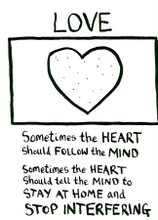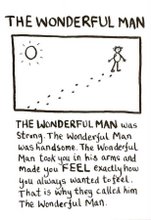14.05.07
What is said and left unsaid at a time like this is very poignant.
There is a clear taboo in the way that you died and we are now discovering the magnitude of human insensitivity regarding the self-death of a loved one.
I have been mulling over the various comments made to me during their last few days.
Mostly, there are a few people who stay close to you in this circumstance and do their best to help you through. But it really is like the blind leading the blind - isn't the worst possible scenario to contemplate the death of a loved one? - a partner, a spouse, a sibling, a child - that pretty much covers all eventualities because we are all one of the above. It it the unthinkable and I am sure something we only contemplate momentarily given the awful nature of such a projected occurrence and how just imagining it for an instant can make us feel.
And then it happens to you and you feel the pain, the loss, the absolute shock, the realisation that you have to come to terms with it because in his mercy, God has not been so good and he has left you here alone - and it is the most soul-destroying, life-sapping, heartbreaking situation in which to find yourself. Because you cannot change it - you can only talk about it, cry and cry some more and hope that each day that passes will bring you closer to some kind of normality; when the only normality you want is to bring the one you have lost back.
But, the worst part is knowing that literally something has died in you and you simply cannot retrieve it. It is logical that when you lose this person so close to you, so integral to your own existence, so bound to you that with their passing something in you is culled, trampled and effectively destroyed. So you deal with that loss too.
I think about this a lot, John, and I wonder how you could have contemplated leaving us behind when you knew how painful loss and death was - the death of your mother had a profound effect on you and it is clear that despite stuffing yourself with synthetic emotional inhibitors for a period subsequent to her death, you never managed to overcome losing this woman who meant so much to you in life and the sadness of her loss always lingered with you.
And then I think that knowing how low our losing you makes us feel and how I so wished initially to be with you, even if it meant dying too because I could not imagine my life without you, nor did I want to - that death was probably something you saw in two very different ways. It's this eternal conundrum that I cannot solve! Why, if you knew how much it hurt, could you subject us to the same?
However much we try not to be, we are defined by this loss - people avoid calling you, citing their belief that you are not in a good place to be taking phone calls - in reality it because they have no idea what to say to you and they are scared shitless of the same thing happening to them.
It's a selfish comment as in the aftershock of loss the one thing you pray for and crave is some kind of human contact and reassurance that this temporary madness you feel is surmountable and normal. What is not articulated leaves us deaf - we cannot hear what is not said.
Or there are those that deign to comment on your state of mind - as if you do not know that this temporary insanity you feel is not normal in some way - and what you wouldn't give to revert to the used-to-be, when the person you so loved was here. And how your struggle is simply to sidestep the tears and sadness and not be a bother to those around you - because you see how they suffer with you and how sad your pain makes them feel. Sadness engenders sadness.
The very nature of non-articulation is that it leaves us disjointed and isolated; just like you sweet John. Silent and alone.
In reality, the inarticulate friend is no friend, because we cannot hear you, so it's like you don't exist.
Subscribe to:
Post Comments (Atom)











No comments:
Post a Comment